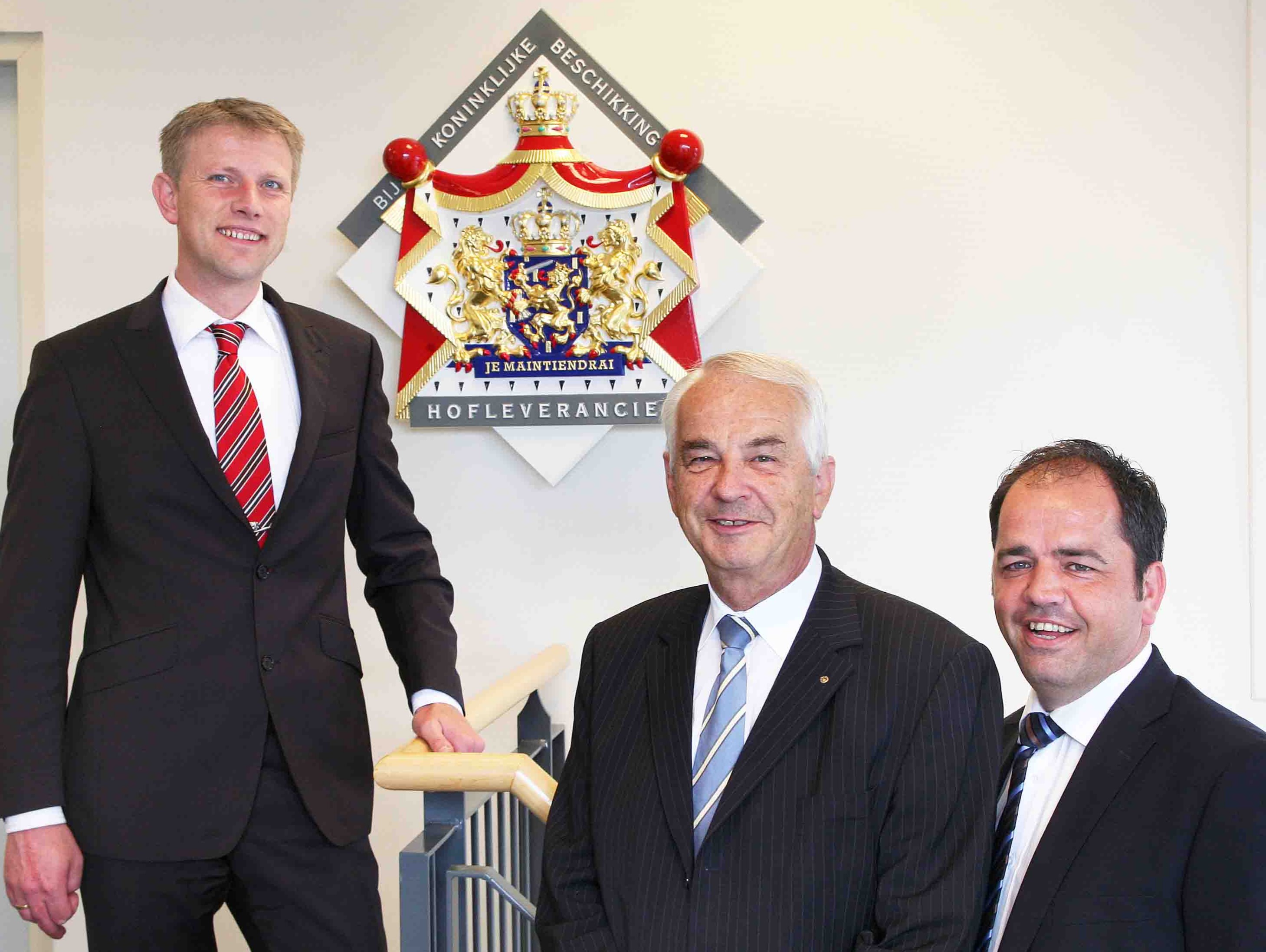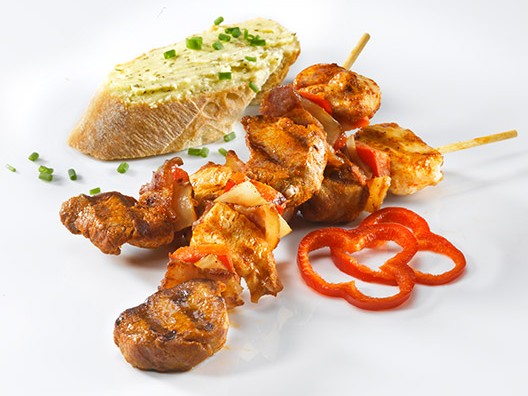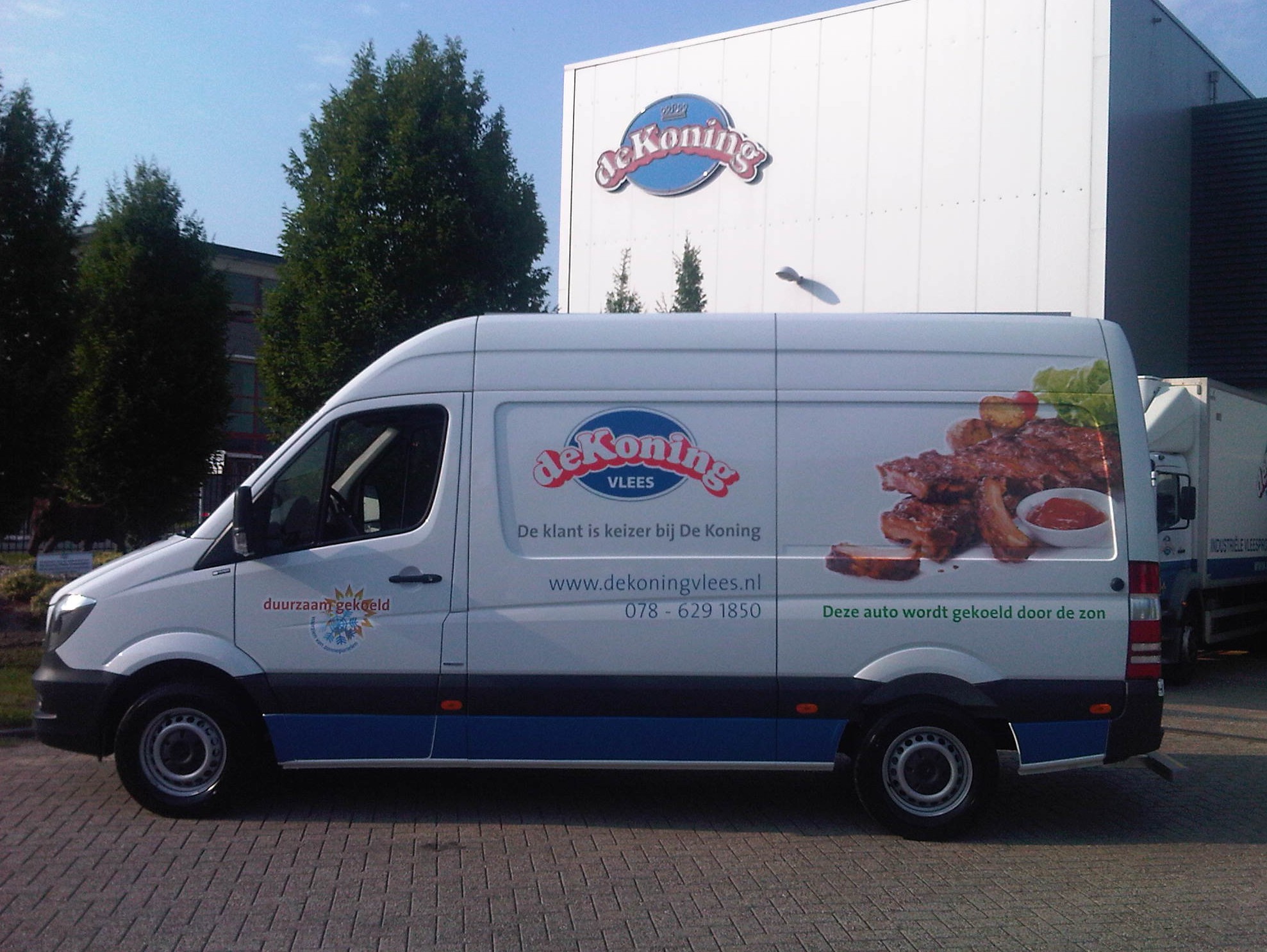
De Koning Vlees B.V. produces tasty meat products for supply to the food processing industry, the food service sector and institutional kitchens at home and abroad – and even to the Dutch royal household. Managing director and owner, Arjan de Koning: “Our company culture can be summed up by six core values: customer focus, enterprise, pragmatism, results focus, commitment and respect.”
Ten years ago, in December 2005, De Koning Vlees B.V. relocated from ‘the place where it all began in 1910’ to new and ultra-modern premises on the Bakestein Industrial Estate in Zwijndrecht. During a guided tour we are immediately impressed by the attention to hygiene, the intelligent routing and the sustainable energy solutions. The atmosphere is relaxed; despite lots of hard work and meetings there is still time for fun.
Visitors to the offices at De Koning Vlees B.V. can of course take the lift up from the reception area, but then they would miss out on seeing the old photos on the walls. Halfway up the stairwell, where the daylight floods in from all sides, stands an intricately carved antique wooden sales counter, a slicer dating from before WWII and a display case of objects and implements which all demonstrate the company’s rich history. At the top of the stairs is the icing on the cake: a striking coat of arms displaying the words ‘Bij Koninklijke Beschikking Hofleverancier’ (‘Royal Warrant of Appointment’). “We started to gather together the relevant information two years before our anniversary,” says Arjan de Koning. “That was no easy task. Many documents were in the Municipal Archive of Rotterdam which came under heavy fire during WWII.” The Royal Warrant was awarded to De Koning Vlees B.V. in 2010. In order to be considered for such an honour, companies must have an outstanding reputation and excel in terms of quality, solidity and continuity, and they must have existed for precisely 100 years.
“We’ve grown significantly in the past 10 years,” continues Arjan. “There has been a considerable increase in our number of employees, an even bigger increase in our turnover and now that we are in our new premises production can keep pace with that growth. It’s now time for organisational optimisation; to professionalise the management. Now that we’re expanding from a small into a medium-sized company, we need to reassess our traditional organisational structure. For a long time our company was headed up by just one director. Ten years ago my father and I split that role between us, and 18 months ago we added a third member to the board: Jacques van der Linden. His expertise lies in organisational optimisation so his focus is on further professionalising the company.”
'A suitable product to meet every need'
Arjan makes a point of walking around the factory at least once a day. “That ensures I stay involved with what’s happening on the shopfloor,” he comments. On the day of this interview, I accompany him on his walk through the entire factory. In the area where meatballs are being produced, I comment that they look quite big. “This customer has requested them in this size, so that’s what we deliver,” explains Arjan. “The type of meat, weight, size, shape, flavour, colour, whether they should float or sink in soup – the customer can dictate exactly how they want them.” In the meantime, in the butchery section, spareribs are being marinated and a batch is ready for precooking. “In our kitchen area, we employ professionals who know just how to prepare a delicious piece of meat,” he says with a sense of pride. “However, because we’ve automated a number of processes we’re making less and less use of the cutting tables,” adds Arjan. “That’s why we’re currently taking a critical look at this section in terms of the space and the layout; how can we work more efficiently? By asking employees for their ideas you increase their involvement. We might end up creating more room for spareribs because there’s a lot going on in that area at the moment.”
In the final cold store, where crates are stacked on pallets ready for delivery to customers, I see all kinds of meat products ranging from pre-cooked pork neck to huge bags filled with bacon cubes and ham strips. “Those are for a Chinese restaurant,” says Arjan. “In oriental cuisine there’s a big demand for pre-cooked pork neck because it saves them hours of preparation time, and they use the ham strips in fried rice.” On another pallet I see a wide variety of pizza toppings. Arjan: “We supply products for all styles of cooking – not just Chinese and Dutch but also French, Italian, Greek, you name it. We have a suitable product to meet every customer need, including for the healthcare sector and institutional kitchens. Our customers can depend on a consistently high quality and fast, on-time delivery.”
“In addition, we want to be an attractive employer where everyone’s contributions and opinions are valued,” he continues. “That’s why we have an open culture of dialogue. We’re well aware that our success depends on the performance of the entire team, so a good working atmosphere is very important. Our staff turnover is low so I think that means we’re doing a good job. As the management team, one thing you have to bear in mind is that employees are more alert and more vocal than say 10 or 20 years ago. They know more, want more and are capable of more. We believe that our workers should find their jobs stimulating since that boosts their enthusiasm! The growth in our workforce means that things are continually changing. If someone who has been with us for 35 years wants to take early retirement from a management role, how we will fill that gap? Should we look deeper in the organisation, or broader? We have people who want to progress within the company, and people who want to work more – or fewer – hours. These are all interesting issues to tackle.”
Arjan discovered that a seemingly small change can have far-reaching consequences. “In the past, the delivery routes were always planned by one person. But the company growth meant it was becoming too much for our planner to cope with, so we needed to automate,” he explains. “The direct consequence of automating the process was that the planner’s role became less stressful and the delivery drivers’ routes became more efficient. The new routing not only saved a lot of time but it also enabled us to make considerable savings on fuel costs and to use our storage space more intelligently: we start by preparing route 1 followed by route 2 and by the time route 3 is ready and has to be dispatched, route 1 is already on its way.” And what happened to the planner? “He has moved onto the next stage in the process and now ensures that the trucks can leave quickly – loaded with the right products, of course, because we strive for 100% quality across the board. He has settled into that role well and enjoys the work. We later discovered a further advantage of automation: the people in the butchery and cutting sections can now focus on production for the relevant route, which has further reduced the stress level in that department and means that we don’t have to start work earlier.”
‘Our success depends on the performance of the entire team’

“In the run-up to optimising the process we briefly got caught up in a vicious circle,” recalls Arjan. “We knew we had to do something, but where to start? That will ring a bell with many managers; if you want to tackle ‘A’, you really have to change ‘B’, but to change ‘B’ you must first alter ‘C’, and so on…and before you know it, you’re back where you started and nothing gets done. The trick is to take a helicopter view, to discover which link in the chain you can begin with. And if you can’t find it, there’s only one option: just make a start somewhere. That’s what we did – although only as a concept. That ensured less resistance among employees. They knew that if it didn’t work we could always go back to the old way of doing things. But thankfully that wasn’t necessary.”

As everyone who meets him soon discovers, Arjan is a fan of innovative ideas. “To be able to think up new approaches, it’s important to be involved in other activities outside of work too,” he states. “For example, I enjoy organising youth camps and I’m on the committee of the local church. That also helps your own children to learn to take a different view of the world. By doing something completely different in your free time, it’s easier to think ‘out of the box’ and you’re more likely to hit on innovative solutions.” To illustrate his point, he concludes: “You’ve probably already heard the saying: ‘Everyone knew that it couldn’t be done until someone came along who didn’t know that.’”
Source: © de Koning Vlees BV